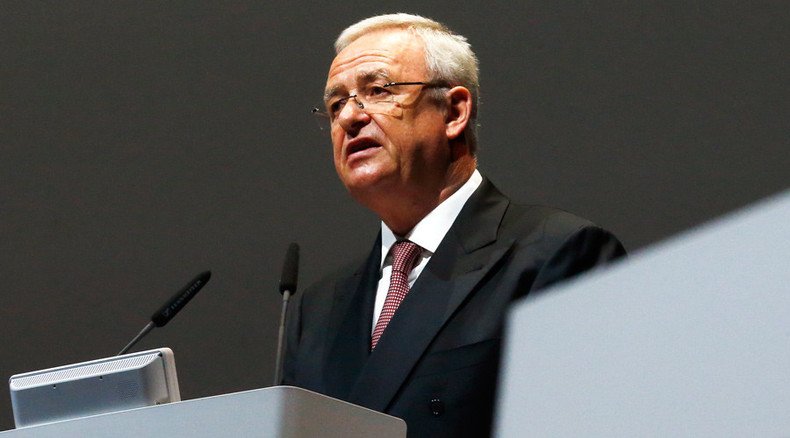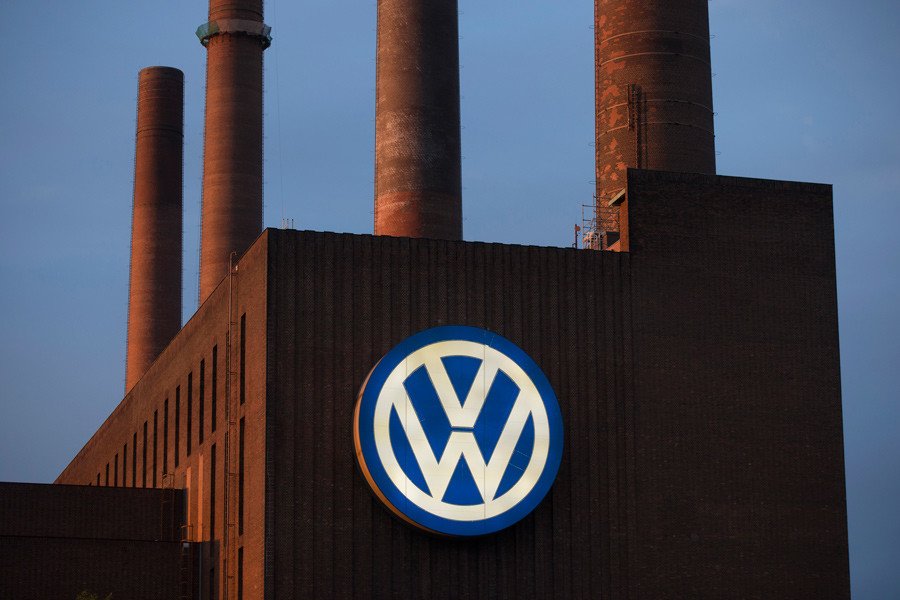Volkswagen sideswiped by environmental law and ‘governments cashing in’

The emissions scandal involving the German automaker is an opportunity for governments to cash in on environmental law, said economist Dr. Jack Rasmus. Many countries are going to go after Volkswagen in order to protect their auto industry, he added.
The head of Volkswagen Martin Winterkorn resigned over a vehicle emissions scandal on Wednesday. The US Environmental Protection Agency found the German company had been rigging emissions tests. The world's largest car maker could face fines of up to $18 billion.
RT: Volkswagen will be paying billions of dollars in fines, but where will all that money end up?
Dr. JR: Well, this whole scandal is the equivalent of Volkswagen’s Deepwater Horizon crisis. Remember British Petroleum [BP] was fined billions of dollars as the result of the oil spill in the Gulf. But this is going to be even bigger: up to $18 billion just on 500,000 cars in the US where Volkswagen has admitted the problem affects 11 million of its cars worldwide. So this is going to be an even bigger billion dollar event in costs to the auto company. It will spill over to other auto companies as well. We’re going to have the equivalent of bank stress tests now globally on all diesel vehicles. It is really a hard hit to the auto industry as it peaks now - its sales are peaking worldwide. So it is a major crisis and especially for Germany economically.
READ MORE: Volkswagen chief executive Martin Winterkorn resigns
RT: If the crisis does spread to other car manufacturers, presumably we’ll be talking about similar sums of money. Is this really about protecting the environment and people, or is it really a great opportunity for governments to cash in?
Dr. JR: It is a little bit of both. Already California, New York, and other states in the US with environmental protection plans are jumping in and suing Volkswagen. You are going to see class actions suits by consumers and law firms in which they are probably going to ask for something similar to what happened in South Korea. In other words - repay the consumers in the former debit cards, because now the value of their vehicle has dropped virtually to half probably of what it is in resale value. It is going to spread throughout the US, and I believe it will spread elsewhere, [to] South Korea. You can expect China to protect its auto industry by going after Volkswagen and others.
The second largest sales for Volkswagen are in China – about the same size as the US sales. So yes, they are cashing in, no doubt in these cases. But there is a consumer problem here as well. They have been very deceitful. And there is a long history of that with auto companies.
RT: What is the future for Volkswagen on the US market? Is the company in danger?
Dr. JR: I think so. Its stock has already fallen 40 percent… and it is going to drag out over a number of years, but it is going to be a big hit to Volkswagen and a hit to the German economy – 17 per cent of all the exports of the German economy are auto exports. So this is already being reflected in Germany as export numbers and in its stock prices, and so forth.

Volkswagen paying the price
“If the company is remotely professional they know what the Clean Air Act is all about and how much potential penalties are for non-compliance with the law,” said Jos Dings, from Transport & Environment.
RT: It was found that Volkswagen had been rigging emissions tests, and now they could face fines of up to $18 billion. What’s your take on this issue?
Jos Dings: $18 billion is not a definitive fine. It remains to be seen how much they will have to pay. But a law is a law. If the company is remotely professional they know what the Clean Air Act is all about and how much potential penalties are for non-compliance with the law. It is always smarter to comply with the law. But in this case, unfortunately, I have to add that the Americans are slightly better at law enforcement than we are on this issue in Europe.
READ MORE: Germany warns auto makers of follow-up tests after VW scandal
RT: You said that $18 billion is not a definitive fine. How significant can be the increase of the penalty, do you think?
JD: I don’t know what they are going to come up with - $18 billion is a maximum number. As far as we are concerned legislation is legislation and other carmakers apparently comply with it. If you don’t comply then that’s the price you pay.
RT: What can you tell us about the standards today? Have they changed a lot for the last decades?
JD: The car industry hasn’t come such a long way, as you might well believe, exactly because compliance is a problem. The standards have been tightened over and over again… Today’s diesel cars are not noticeably better than those of 10-15 years ago. And that is the issue: standards have been tightened; the real world performance has not improved noticeably. It was a matter of time until some government started to take this seriously and figure out that there was some deliberate cheating going on, which is clearly illegal not just in the US, but also in Europe.
The statements, views and opinions expressed in this column are solely those of the author and do not necessarily represent those of RT.












